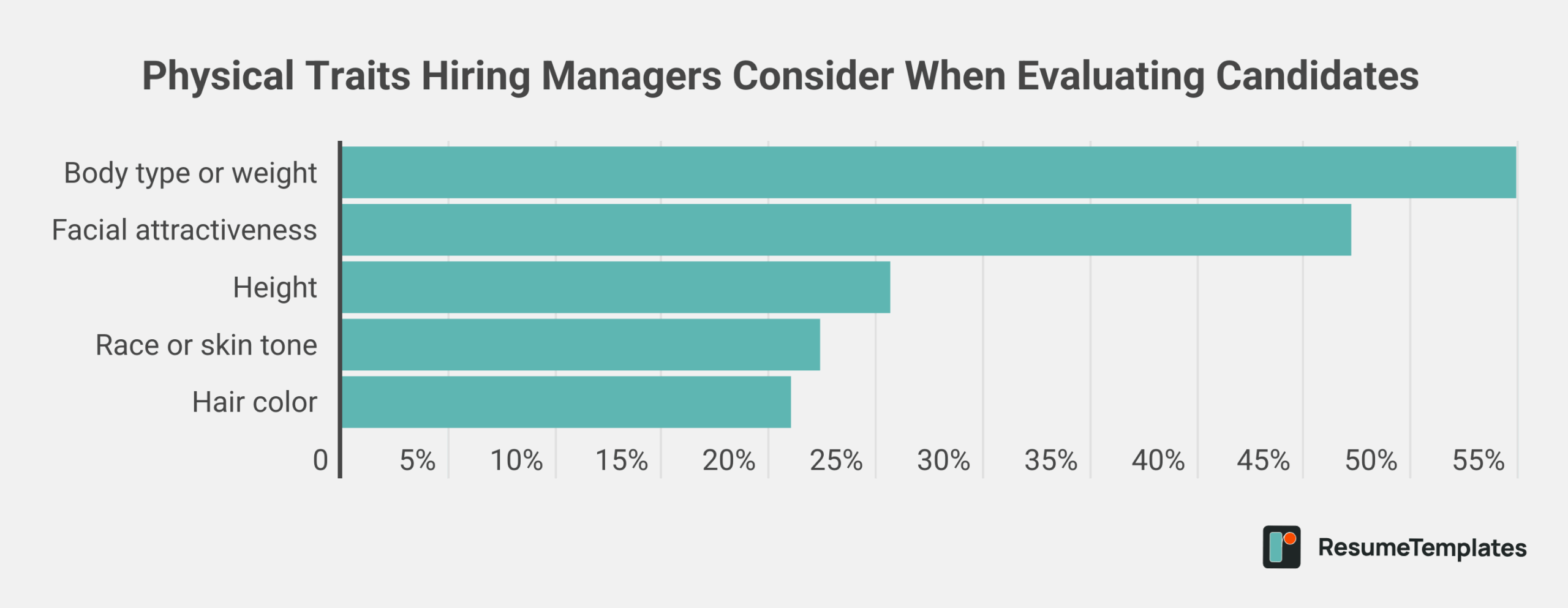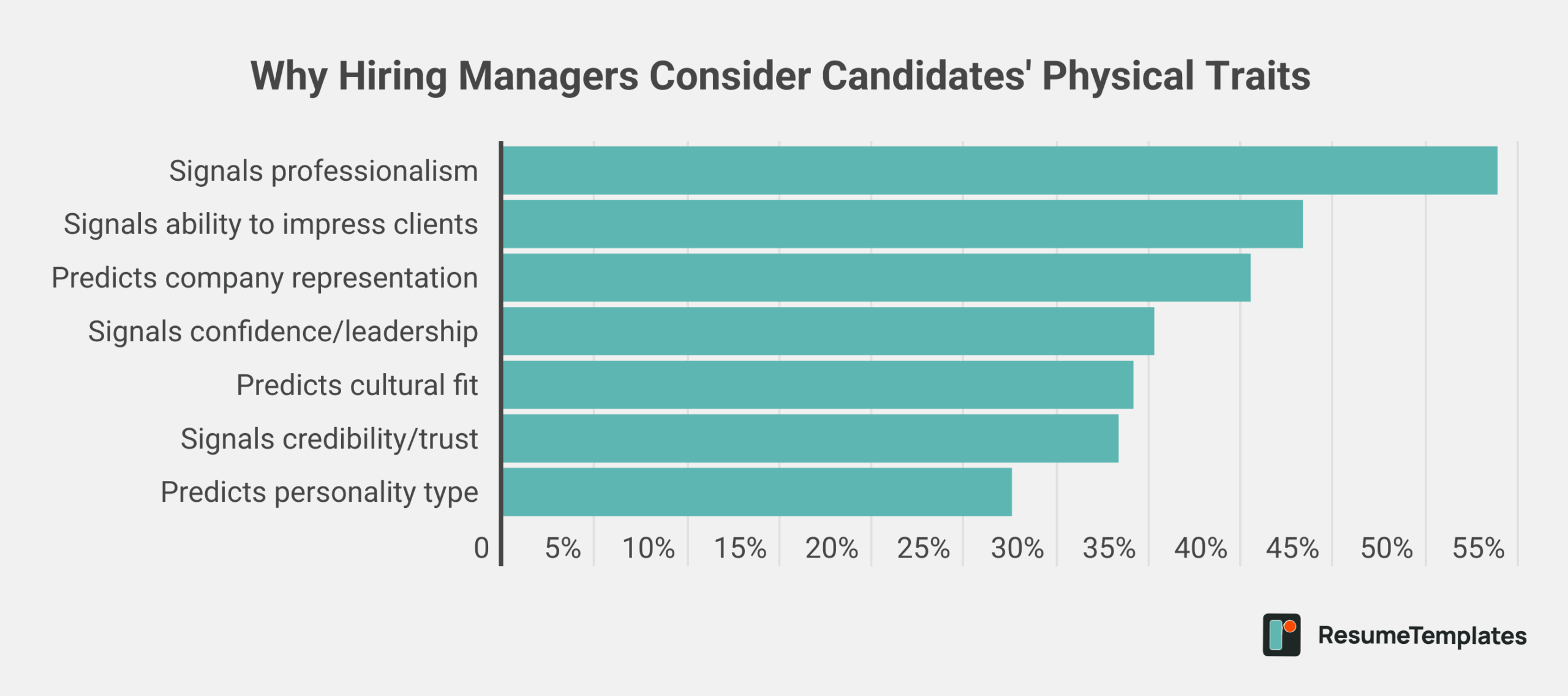In August, ResumeTemplates.com surveyed 882 hiring managers to reveal how common it is for candidates to face discrimination based on their physical traits, such as facial attractiveness, body type, race, and hair color.
Editor’s note: Under U.S. federal law, it is illegal to make hiring decisions based on race, color, religion, sex (including gender identity and sexual orientation), national origin, age (40+), disability, or genetic information. Some states and cities also protect against discrimination based on traits such as weight, height, and hairstyle. While some traits discussed in this survey are not universally protected, they may still lead to unlawful discrimination if they serve as a proxy for a protected category.
Of the hiring managers surveyed, 53% make discriminatory hiring decisions that factor in physical features. Of this group:
- 40% would choose a conventionally attractive candidate over a more qualified one
- 85% form impressions about a candidate’s competence based on physical traits
- 34% say considering physical traits helps assess cultural fit
- 53% look up candidates’ photos before interviews, some rejecting candidates based on their photo alone
- 48% say the political climate makes them more comfortable factoring in physical traits
More Than Half of Hiring Managers Say Candidates’ Physical Features Play a Role in Hiring Decisions
Over half of the hiring managers surveyed (53%) say that a candidate’s inherent physical traits influence their hiring decisions. These include facial attractiveness, body type, race, and hair color, some of which (such as race) are protected under anti-discrimination laws.
Of those who admit physical traits play a role, nearly half (47%) have hired someone primarily because of their appearance. Further, 28% of this group judge female candidates more harshly on physical traits like attractiveness, weight, and age.
Male hiring managers were significantly more likely than women to say physical traits impact their decision-making (61% vs. 46%). Younger managers were also slightly more likely to weigh looks in their hiring process.
Industry mattered, too. Hiring managers in sales were the most likely to factor in physical features when evaluating candidates.
According to this survey, white managers were no more likely than managers of color to report considering physical traits in their hiring decisions.
Hiring managers make decisions based on candidates’ body type and race
Of hiring managers who consider physical traits, more than half admit that body type or weight (55%) and facial attractiveness (47%) have influenced their hiring decisions. About 25% say height factored in, while 22% cite race or skin tone and 21% hair color.
Of those that admit particular racial preferences, 86% say they prefer to hire white candidates. This constitutes direct racial discrimination, which is prohibited under U.S. federal employment law. Hiring managers with hair color preferences say brown and black hair colors are the most preferred.

“Bias toward physical traits is often subtle and goes unnoticed unless someone has received training to recognize it,” says Julia Toothacre, ResumeTemplates.com’s chief career strategist. “For many, this bias operates under the surface until it’s brought to their attention. It’s natural for us to gravitate toward people who look like us, sound like us, or have features we find appealing.”
Hiring Managers Feel Physical Traits Signal Professionalism, Competence, and Cultural Fit
Why do hiring managers factor in physical traits? A staggering 85% of the hiring managers surveyed say they form impressions about a candidate’s competence based on their physical traits at least sometimes. Nearly one-third (32%) say they do this often, and 11% admit they do it all the time.
More than half (54%) say physical traits reflect professionalism or attention to detail. Another 43% believe certain physical traits help candidates make a strong impression on clients or customers.
Forty percent see physical traits as a cue for how well someone will represent the company publicly, while 35% link it to perceived confidence or leadership potential. A similar share (34%) say it helps assess cultural fit, and 28% admit they make assumptions about a candidate’s personality based on how they look. Employment law experts warn that this “cultural fit” can be used to mask discrimination when it excludes candidates based on protected traits.
Write-in responses reveal a mix of rationalization, discomfort, and candid reflection:
- “It helps to sell products.”
- “If people are extremely overweight, they sometimes are unable to keep up with physical tasks.”
- “I don’t think I want to, but I think I subconsciously take them into account.”
- “Physical appearance sometimes influences psychological assessment.”
- “I was, unfortunately, raised in an era where weight (including my own) often defined the worth of a person.”
- “It’s not something I do on purpose, but if I am being honest, a person who presents themselves as attractive and is well-dressed tends to stick to my memory more on the positive side.”

“Hiring managers may favor candidates they believe will resonate with a specific audience. They may also consider the existing team dynamic and choose someone who physically resembles the current group,” says Toothacre. “While this isn’t fair, it reflects how bias can surface in the hiring process.”
Toothacre points to the importance of diversity, equity, and inclusion (DEI) training for hiring managers that addresses these specific types of hiring bias.
Many Hiring Managers Choose Appearance Over Qualifications
When physical features go head-to-head with qualifications, many hiring managers choose appearance. Among those who consider physical traits in hiring, 40% say they’d pick a conventionally attractive candidate with a good resume over someone less attractive with an outstanding one. Just over half (54%) say they’d go with the more qualified candidate.
The bias often starts at the beginning. Over half (53%) of hiring managers who weigh physical traits say they often or always look up candidates online to see what they look like before even scheduling a conversation. More than a third (37%) admit they’ve rejected someone based on their photo alone.
“Decades of research shows that conventionally attractive people are often perceived as more competent, capable, and likable,” says Toothacre. “Media plays a significant role in shaping and reinforcing beauty standards, making the bias even harder to detect.”
Half Say Political Climate Is Making It Easier To Consider Physical Traits
Nearly half of the hiring managers surveyed (48%) say the current Trump administration and political climate has made them feel more comfortable factoring in a candidate’s physical traits during the hiring process. Considering protected traits in hiring decisions can be unlawful.
In the early days of his second term, President Trump signed executive orders that dismantled federal DEI infrastructure and reversed affirmative-action requirements for federal contractors.
“While DEI training can be a polarizing topic, one of its strengths is helping managers recognize their own biases,” says Toothacre. “Awareness alone doesn’t erase bias, but it can foster more fair and objective hiring decisions. Discrimination in hiring has existed as long as hiring itself, and those inclined to discriminate will likely continue regardless of DEI programs. However, eliminating these programs risks reducing awareness among those who would benefit from it.”
Methodology
This survey was conducted in August 2025 using the Pollfish platform and gathered responses from 882 participants. All respondents were employed for wages, held a managerial role or higher, were at least 25 years old, earned an annual income of $50,000 or more, worked at companies with 11 or more employees, and had at least an associate degree. Respondents represented a range of industries and were screened to confirm they are involved in hiring decisions.
Resume Templates offers HR approved resume templates to help you create a professional resume in minutes. Choose from several template options and even pre-populate a resume from your profile.
